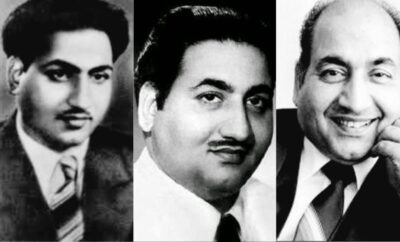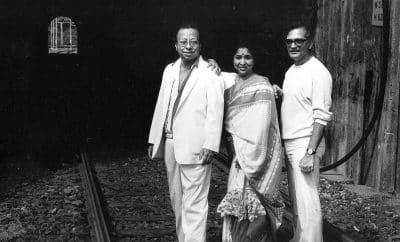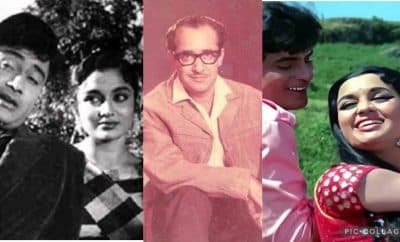Legends
I Don’t Compose Unless I’m Compelled From Within – Kaushal Inamdar
Amuchya manaamanaat dangatey Marathi
Amuchya ragaaragaat rangatey Marathi
Amuchya urauraat spandatey Marathi
Amuchya nasaanasaat naachtey Marathi
Laabhley aamhas bhaagya bolto Marathi
Zahalo kharech dhanya aikato Marathi
Dharma, pantha, jaat ek jaanto Marathi
Evadhya jagaat maay maanato Marathi
Above lines are from the Marathi Abhimaan Geet penned by poet Suresh Bhat. For those who are well versed with the language feel honoured to be associated with this song. For those who have heard the song it gave a feeling of pride. It must have been overwhelming to sing and compose such a number. The first name which comes to our mind with this song is Kaushal Inamdar. A known name in the field of singing and composing specially in Marathi language. Kaushal Inamdar has made the song immortal. His work in music spans from composing music for films, television, drama, events, concerts, ballets, advertisements and albums. Singing, composing, writing, theatre, he has done it all. The multi talented musician has worked with some talented artists like – Shankar Mahadevan, Suresh Wadkar, Shreya Ghoshal, Mahalaxmi Iyer, Ravindra Sathe, Swanand Kirkire etc. His repertoire is not restricted to just film songs but he has covered a vast realm in the field of music. From fusion music to semi classicals, from children’s song to recreating some eternal classics!! A closer look at his wonderful musical journey in his own words will surely be exciting for his fans and readers.
Kaushal Inamdar in conversation with TheSongPedia!!
Tell us about your memories of your first association with music. How did music come in your life?
Music came to me genetically. My maternal grandfather Shri Shankarrao Biniwale was a violinist. He used to play the violin for silent movies at the Bhanuvilas theatre in Pune. In 1932, when V. Shantaram decided to produce the first Marathi talkie, Ayodhyecha Raja (coinciding with the first Indian talkie, Alam Ara), he called my grandfather to play for the movie. Govindrao Tembe, the music composer and lead singer of the movie, also played the protagonist of the film. There were only three musicians, a tabla, an organ and a violin, which were played live on the sets and recorded simultaneously along with the shooting of the film. There was no playback or recorded music! After that, my grandfather went to Italy to learn western music. His escapades there are a material for a different article altogether. I have narrated his story here.
My grandfather was an insomniac. At night when everybody fell asleep, he used to attach a ‘mute’ to the violin bridge (which muted the sound of the instrument) and played through the night. Whenever I went to Pune for my vacations, I slept in the same room. I glided into sleep hearing his ‘Malkans’ or ‘Jhinjhoti’ and I was woken up by his ‘Lalit’ or ‘Bhairavi’. I have heard his violin so much in my sleep as a child, that even today when I am suddenly shaken out of my sleep, I hear the notes of his violin clearly! I think that was the first influence of music in my life.
My mother also played the violin, and my father although not a musician is a music lover and music played in our house 24/7.
From where and when did you start formal training?
As a child, I was interested in a lot many things, but serious about none! I loved Hindi film songs and I was a compulsive hummer! But music wasn’t the only thing on my mind. I loved elocution and debates and my father thought I have great aptitude for civil services if I was groomed well. So he sent me to a boarding school in Panchgani. Our Principal, Mr. Burjorjee Billimoria himself played the piano quite well and I was inducted in the school choir. That was my introduction to western music. Due to an allergy leading to asthma, I had to return to Mumbai after two years.
I was still humming Hindi film songs and now I was also hooked on to Ustad Ghulam Ali Khan and Mehdi Hassan Sahab. My mother noticed my fondness for singing. It was her wish that I learn music formally. So, one day, a big, bald middle-aged gentleman stood at our door and said he was there to teach me and my brother music. He introduced himself as Kamalakar Bhagwat. Only later did I realise that he was an accomplished music composer with a lot of great compositions to his credit, such as Omkar Pradhan Roop Ganeshache and Ghaal Ghaal Pinga Vaarya. At that time, I didn’t realise it, but I greatly benefitted by learning initial music under the guidance of a gifted music composer. But I have only myself to blame that the education did not last long as I was still not serious about learning music. It was only after I turned a music composer that I started learning under the tutelage of Pandit Satyasheel Deshpande. Satyasheelji taught me the nuances of composition. His eclectic understanding of music not only helped me become a better musician but also a wise one.
What marked the beginning of a music composer? Was it always on your mind?
Actually, becoming a music composer was never on my mind. It was purely by accident that I waded through these waters, but not before contemplating to be a politician, a diplomat, a Civil Servant, a journalist, a political scientist, an actor, a writer, and a lawyer before becoming a music composer.
But the love for music was always there. It actually started with my love for ghazals and poetry which I had started writing by the time I was in college. In my third year, I wrote a screenplay of a movie which started as a leisure time storytelling session among friends. As a Hindi movie must have songs, I wrote the songs for the screenplay too and also ended up composing them. Luckily for me I had friends who not only supported me but chipped in with their talents in my first music composing venture. Kamlesh Bhadkamkar, who’s now an accomplished arranger in his own right had just bought his first professional keyboard. Ajit Parab, now a singer composer volunteered to sing the songs along with some other college friends. A friend’s father helped us get a studio to record the songs. Soon, I found myself composing and writing more and more songs. I had already started my career as a writer in television. I was apprenticing with the veteran director, Lekh Tandon, thanks to a very flattering recommendation from my friend, Milind Gunaji. Slowly but surely the lure of music pulled me towards itself and I gave up the scriptwriter’s profession for a much more enjoyable profession in music.
What motivates you every day to keep composing?
To tell you the truth, I am a very lazy composer. I don’t compose unless I am compelled from within. The motivation can be anything. A memory, a fleeting everyday visual, the rhythmic sound of a faulty fan, a tragedy, a scene from a movie! Sometimes even boredom motivates me. So I am not an everyday music composer. R. D. Burman once said that merely making a tune is not a composition. You need to nurture a tune to turn it into a song. I give a tune enough time to be nurtured.
Tell us something about the Abhiman Geet, its making etc.
I was once told in a private radio station that they don’t play Marathi songs on their Mumbai station because they felt that it would make their station feel downmarket. I was appalled at the attitude they had for the local language. But, as a caterpillar turns to a butterfly, you give any problem to the musician, he’ll turn it into a song! So that’s what I did! I decided that if I make the biggest song ever produced in Marathi and about Marathi then they’d have to notice it. And they did. It would have been difficult to ignore a song sung by more than 450 singers, wouldn’t it! But the aim of the song was not merely to score a point over somebody. The aim was to show that languages are not superior or inferior. I always say that Marathi Abhimaangeet is not just a song for those whose mother tongue is Marathi. It’s a song for all those who in fact, HAVE a mother tongue.
About his parents’/family’s role in the journey, he says –
The support of parents has been rock solid. When I first composed a Marathi song, my father told me, “I can take care of you for life for this single composition that you have made, without you having to earn a paisa. But would you like that? So, make your music and fend for yourself, but remember that we, as your parents, are always behind you to watch your back”. I think that at once gave me a boost to my self esteem as well as made me feel secure. Even my wife, Suchitra, has been a very solid support. At one time I was earning most of my income from scoring the background for television soaps. But I felt that it was robbing me of my spontaneity and creativity. Stopping that would mean a dip in our finances. But Suchitra motivated me to follow my passion.
What type of songs do you like to compose?
I like to compose all kinds of songs. There is no barrier. Each emotion demands a different genre or type of music. But essentially, I am a storyteller in the guise of a musician. I like the song to be an experience. I am more comfortable with Indian music or music rooted in our land. I think that the connect with our traditions and roots makes us more mature and multi-layered. And also I enjoy composing songs that have the quality of good poetry. Good lyrics are the elixir of good songs!
How is regional cinema music different from the mainstream Hindi music?
I think Hindi film music is becoming monocultural. Short phrases, hooklines, most of them in the upper octave make most songs sound similar. There is more of a struggle in Hindi to sound ‘different’ than to sound ‘good’. Comparatively, there is more complexity and aesthetic quality in regional music. Of course, this is not absolute. Hindi cinema continues to give good music. But to speak for myself, I prefer to do Marathi cinema more than Hindi because I get to do much more in terms of musical quality in Marathi than I would in Hindi. I do Marathi cinema and music as a matter of choice and don’t see it as a stepping stone to Hindi. For example, I did Balgandharva, which was Natyasangeet and Indian classical, followed by Ajintha, which had a ring of folk music to it and then Sanshaykallol which had very contemporary music followed by Yellow which had rock music and then Rangaa Patangaa which had a ghazal and qawwali and I just did a film where I recorded a blues song sung by Shalmali Kholgade and I recorded the whole track with acoustic instruments in the US. I think that while music in Hindi is watched through a commercial lens by the makers, in regional cinema, especially in Marathi, it is looked upon with a lot more reverence. Of course, none of my observations are absolutist in nature.
Composer, writer, making educational music videos through vlog. Which one is his favourite? And he replies –
Everything! I think it’s a holistic endeavour. I make a song, then I like to get to the bottom of the creative process. I like to demystify music. Hence, the vlogs. Even my TEDX talk is about how music can be understood by everybody!
How do you balance yourself with these multitasks? Your inspiration in all your works?
As I said I view music holistically. It is a part of life. An absolutely necessary part. My inspiration in all my music is to be a better person. Music is my way understanding the complexities within me and in the world that is around me.
What is your take on today’s music? About the remixes or the much-westernized songs?
Contrary to what view the purists might hold, I am not against remixes as a concept. I think it is one way to interpret and reinterpret our glorious tradition. The problem with a lot of remixes is that they lack reverence for the original. As far as too much westernisation is concerned, I feel that we need to realise that western is not necessarily modern. We have to investigate modernity in the Indian framework too. I also think that it will be inevitable. People will go everywhere but return to their roots.
He also shared some of his fond memories of artists and fans –
Lot of great memories with artists that I have worked with. I have particularly enjoyed working with Hamsika Iyer who I feel is one of the most underutilised singer in the Hindi film music zone. Not only is she supremely talented and versatile, but she’s also very dedicated. I remember that we recorded the song Mann Chimb Pavasali thrice but somehow it was not clicking with us. Hamsika said that she’d like total silence not just in the studio but also outside. So we went to the studio at 3:00 AM and recorded the song for the fourth time. That take clicked.
I am fortunate to have dedicated fans who not only appreciate me but also inspire me. One such fans is my very good friend Asmita Pande. Not only she has all my songs by heart, but when I decided that I would go to the people to fund the Marathi Abhimaangeet, she was the first one to contribute. The faith of my friends and fans in my music is the reason that I can afford to do offbeat projects from time to time.
About his future projects he says –
I have one feature film in the pipeline. And my brother, Vishal is doing two feature films which will keep me busy as far as films are concerned. I am also doing music for a Marathi film by Rima Amarapurkar. Apart from that I am doing a very exciting play written and directed by Ratnakar Matkari, a senior playwright in Marathi.
With all the new FM radio channels coming up, do you think there should be an independent one for regional music and songs?
Absolutely! I think there is a great thirst for regional music which can be satiated only by dedicated music stations. Hope that all languages get their due and an equal opportunity to bloom.
If you could time travel, which era would you like to compose songs for? And for which singers?
Oh, I always fantasise about it! I would definitely pick the era from early sixties to the late seventies. I’ll do virtually anything to get a song recorded from Kishore Kumar. Of course, all the other greats too – Lata Mangeshkar of the sixties, Asha Bhosale and the divine Rafi Saab and the exotic Geeta Dutt!
Singers and songs that you would love to listen at any point of time, composed by other music directors?
I am RD Bhakt, but I enjoy mostly all music composers. Roshan, Madan Mohan, SD Burman and Salil Chowdhury being some of my other favourites. Special place in heart for C. Ramchandra, Vasant Desai too. And just to experience the grandeur of the Hindi film music it is Shankar-Jaikishen and Laxmikant-Pyarelal. Ravindra Jain never fails to allure me with his mystical compositions and Jaidev Saab is my connect with spirituality. Also, some composers who I feel didn’t get their due enough – like Rajkamal are also in my collection.
As far as Marathi music composers are concerned, I enjoy music by composers like Shrinivas Khale, Sudhir Phadke and Vasant Pawar. Among other music composers I am a big fan of Illayaraja and MS Vishwanathan.
https://youtu.be/sMHzp-0CO2U
Have you thought about writing a book?
I have written a book in Marathi. It’s called Kshitij Jase Disate loosely translated as ‘How I see the Horizon’. It is a collection of articles on music as well as subjects other than music. If I write a book in English, I am pretty sure, it’ll be fiction!
Your message for our readers.
Before I give any message to your readers I must say that your website is absolutely wonderful and growing to become one of the best resources of information and knowledge for the music lover as well as the connoisseur. As far as a message to the readers is concerned, I would love to invite them to the rich world of regional music as well. I shall speak especially for music in Marathi language which is seeing a lot of good music by my contemporary music composers.
To find more about this multitalented musician and his work you can visit his website here.



